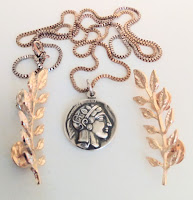Women's History Month would not be complete, or fairly addressed at all, without recognizing the Divine Femininity of one of the greatest cities and civilizations to ever exist among humanity; Athens and the Goddess who rules it. When Athena defeated Poseidon in the contest for Patronage of the Polis, the matter was not settled then and there. The people of the City took a vote. It came down to one, cast by a woman, and Athena became the Goddess of Athens. In a City ruled by men, a female Deity was loved, revered and feared as the Head of State. Of course, this goes contrary to the history we are often told about women being treated as second class citizens in Athens, and such was absolutely not the case in other cities in the Greek world. So what is a fair and balanced examination of the life and amazing contributions that Athena's City gave to humankind and the women who made up influential parts of its population?
Of course we begin Athenian contributions to the world by citing democracy, and generally, human liberation. We should additionally consider that, according to Plato, the more you go back in the history of Athens, the more equalized men and women were. "Military training for both men and women was common in the very ancient days. Athena was adorned with armor - an indication that all female and male creatures that live together can pursue in common the special talents that are suited to each." - Dialogue of Critias. In Plato's time, there's history he knows that we may not today, or that may have been lost. The City, however, was not a universal manifestation of gender, as we are often led to believe. Different time periods had different societies, and probably for very different reasons.
Women may not have been considered equal to men in the later times that we commonly imagine, but that does not mean they were not highly valued or helped make Athens the renowned City of history.
Religion defined the identity of ancient Greeks, and women held very important roles therein. Some of the most important festivals, Plunteria, Thesmophoria, and Panathenaia held women worshipers at center stage. Only women were allowed to undress and wash Athena's image from the Akropolis, and only women were allowed to place the new peplos on Her statue. And Thesmophoria was a woman's festival all together. We are also commonly told that women in Athens were not allowed to venture outside the home and interact with other women or men. This is not true. It was necessary for women to leave the home in order to run the household by buying from markets or getting resources from other natural areas. There were no online grocery orders. An historian's common sense tells us that the only time a woman could have stayed inside 24/7, or even a significant portion of the time, was if she had enough wealth to hire servants to do work for her, or if she had slaves. Then as now, wealthy people were far and few between. It was as well entirely possible for Athenian women to work and make money and to own inherited properties. And women who held priestesshoods were given the due reverence of said clergy along with pay and a portion of sacrifices.
In some cases, it may be difficult to discern the true views of an Athenian Statesman from the narrative that the City laws forced him to uphold. Perikles (495-429 BCE) wanted Athenian citizenship to only apply to those who were born of a mother and father whose families were Athenian. This would have increased the status of Athenian women, either directly or indirectly, by increasing their societal worth. Generally, women in Athens did not enjoy the same rights as men, but that's not to say that they did not make great contributions and have exceptional worth in the eyes of State. To say nothing of what we find when we venture outside of Athens into places like Sparta, where women were exceptionally more free and powerful.
Ancient Athens individually shows us many things that needed changing, but also that women can be leading clergy, women can help lead the City's most important observances, and Femininity can be Godly.
In the Goodness of the Gods,
I'll see you at the next Herm down the road,
Chris Aldridge.
Sources
Picture: "Restoration of the polychrome decoration of the Athena statue from the Aphaea temple at Aegina, 490 BCE (from the exposition "Bunte Gotter" by the Munich Glyptothek). Photography taken by Marsyas - own work. Picture is licensed under Creative Commons Attribution - ShareAlike 2.5 Generic (CC BY-SA 2.5). This picture was not modified in anyway, nor does the author of this blog post claim ownership or support in anyway; full disclaimer. Material located here.
Literary: Cooper, John M. edit, Plato Complete Works, Hackett Publishing Company, Indianapolis/Cambridge, 1997.
Literary: Connelly, Joan Breton, The Parthenon Enigma, Vintage Books, New York, 2014.







